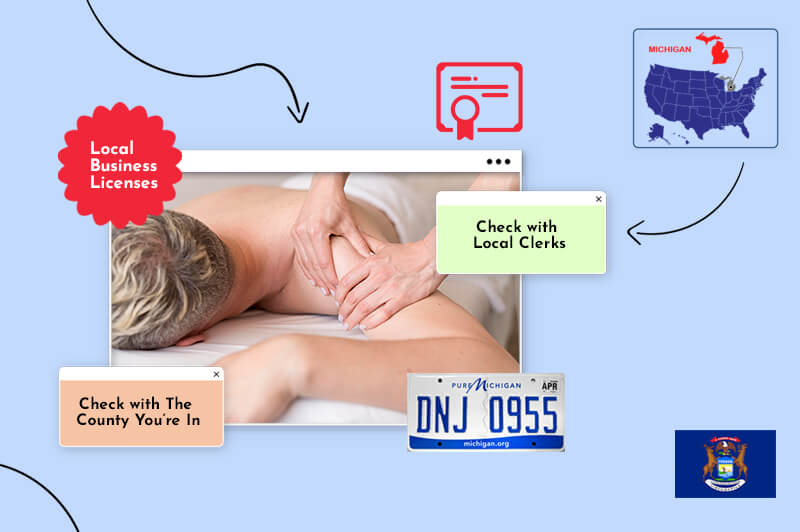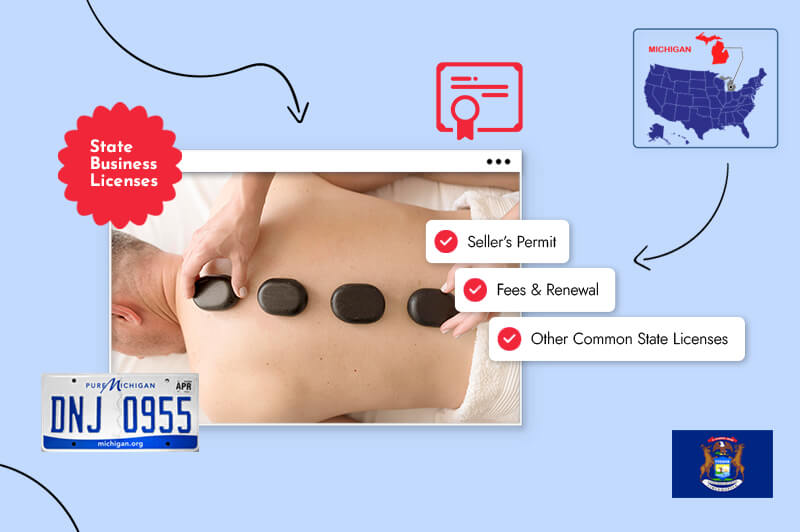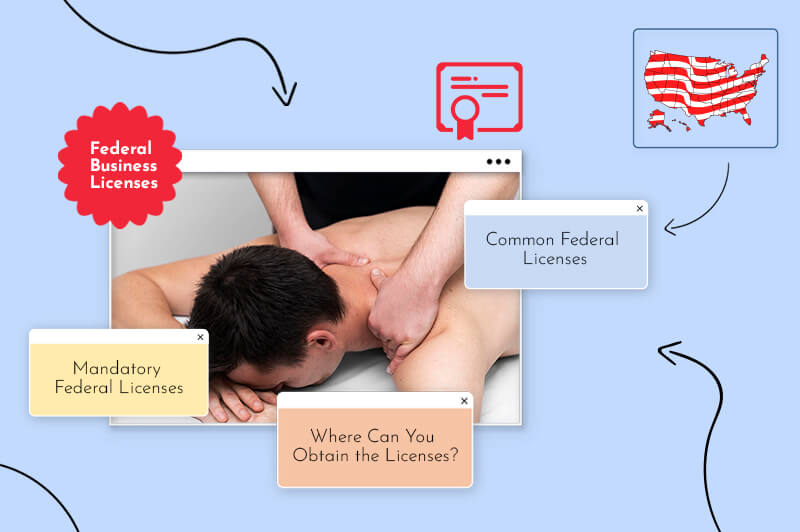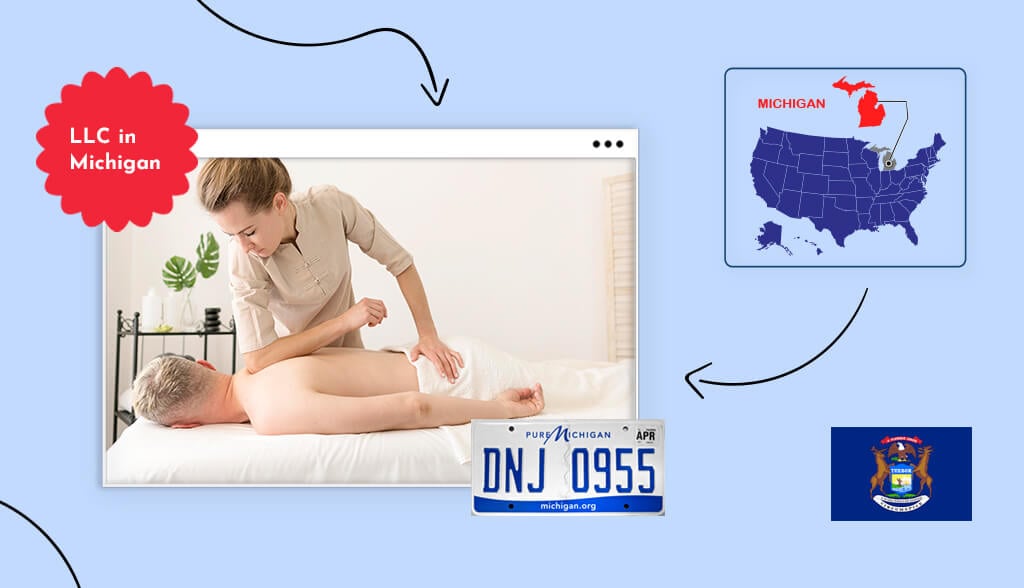Learning how to start an LLC in Michigan is an exciting step toward launching your business. But before you open your doors and get to work, it’s important to make sure you haven’t overlooked any required state or local business licenses and permits.
What are business licenses and permits?
Business licenses allow the owner the right to start, run, and maintain a business within the city, county, state, or country. Each municipality has the right to require a business license, regardless of the type of business that is operating within its borders.
Business permits are regulatory in nature. Permits indicate the business is operating within the safety, structure, and appearance of a business community. Permitting also shows proof that a business owner has agreed to follow the laws and ordinances which are required in a specific jurisdiction.
Failing to confirm whether a business needs licensing or permitting could result in a business owner being forced to shutter their operation and the imposition of steep fines and penalties for noncompliance.
Business licenses
While the state of Michigan does not offer or require an overall business license, unless you are operating in specific fields, there are several municipalities that do require licensing if a business plans to operate in their community. Some of these include:
- Ann Arbor Michigan — Use the business license website or visit the Ann Arbor Permit Desk, 301 E. Huron Street, Larcom City Hall, first floor. Hours are 8:00 a.m. to 5:00 p.m. Monday through Friday. Phone: 734-794-6263 Fax: 734-994-8460
- Battle Creek — City of Battle Creek, 10 N. Division St., Battle Creek, MI, 49014. Hours are 8 a.m.-5 p.m. Monday through Friday. Phone: 269-966-3311
- Detroit — Detroit has numerous business categories that require licensing and/or permitting. They also offer an online questionnaire that helps business owners understand what permits and licenses will be required for their specific business
Contact the relevant state or local government office for more information.
Permits
Michigan does require every business owner, even online businesses who are selling products to have a tax permit. Other permits which may be required include:
- Zoning permits — may be required. All zoning requirements should be verified before you decide where to open your business
- Sales tax collection licenses or permits — whether selling online or offline goods or services
- Health permits — any business which is engaged in the sale of food or hygiene items are required to have a health permit
- Environmental permits — if a business is engaged in disposing of any type of waste
- Signage and/or building permits — may be required before posting a sign on/near your business or if modifying an existing facility
It is also important to be aware of any requirements which may face home-based businesses. Licensing and permitting may also apply to a business that you intend to operate from your home. You can learn more about these requirements from the State of Michigan website.
How to register for licenses/permits
There are several steps to take that you may be required to complete before you are able to start doing business. These steps will help ensure you are not in violation of any local or state ordinances.
- Search for any necessary Michigan general business licenses
- Obtain applicable federal licenses for your Michigan business
- Check for Michigan permits and licenses
- Check city or county for local licensing requirements
- Search for required Michigan professional licenses
- Obtain necessary Michigan business licenses and permits
- Apply for Michigan home-based business licenses
- Maintain your Michigan licensing
What happens if I fail to obtain a license?
Business owners who fail to obtain, and maintain, the proper licenses and permits in Michigan will face penalties. Some of the most common penalties may include:
- Fines
- Penalties
- Forcing the business to close
- Suspension of professional licenses
It is never a good idea to violate any licensing and permitting requirements. The resulting fines and penalties, and the blemish on your business name could be detrimental to your future ability to do business in Michigan.
Local business licenses
Other communities which require permitting are Farmington Hills, Flint, Kalamazoo, Lansing, Livonia, Pontiac, Rochester Hills, Royal Oak, Saginaw, Southfield, St. Clair Shores, Taylor, Troy, and Wyoming. The processes for obtaining other Michigan business licenses vary from area to area.

Check with local clerks
Before you can ensure that you are not in violation of any local ordinance that requires a business to obtain permits or licenses, you should check with local clerks in the township in which your business will operate. The complete list of townships by county, as well as the contact information for the local clerks may be obtained on the Michigan Townships Association website.
Check with the county you’re in
Not every county has separate licensing requirements. However, to ensure that you are not missing any County rules, you should check with the individual county clerk where you are operating. County Clerk listings along with individual clerk contact information may be obtained from the Michigan Association of County Clerks website.
State business licenses

There are certain businesses that require licensing in Michigan. However, there is no mandatory state business license.
Every business owner should verify what their individual licensing requirements may be by checking:
- Michigan general business licenses
- Michigan Townships Association
- Michigan Association of County Clerks
This will allow you to make sure you are in full compliance with all rules pertaining to your business.
Seller’s permit
When someone is selling an actual product to a consumer, they must obtain a Michigan Sellers Permit or a sales tax permit.
Michigan does have a sales tax requirement that requires a license. The regulation is worded as follows: “A person shall not engage or continue in a business taxable under the sales tax law without securing a license, regardless of the amount of sales or the manner of obtaining goods for sale.”
How to obtain a seller’s permit
To apply for a sales tax license, or seller’s permit, a business owner should use the online sales tax application portal. You can also obtain the hard copy which allows you to apply by mail. It is highly recommended that a review of the PDF document be conducted before using the online application portal so you understand what information you will need to complete the online application.
Fees & renewal
Every business license will require a fee. Most permits last only one year. Be certain you are in compliance with all requirements for payment of fees and renewal of your licenses and permits to avoid penalties.
Federal business licenses

Federal business licenses are not a requirement unless a business is operating in certain fields. However, if your business dealings are primarily in those categories, then licensing is mandatory. Anyone who believes their business may be subject to federal licensing requirements should carefully review the appropriate federal agency websites (provided below) to ensure they are in full compliance with all regulations.
Are there mandatory federal licenses?
While a federal license to operate a business in Michigan is not a foregone conclusion, there are certain industries in which a business may be required to be federally licensed to operate in any state. Businesses that operate in agriculture, alcohol, tobacco, or firearms, certain commercial fisheries, transportation, and other fields.
Common federal business licenses
The following business categories require a business owner to file for a federal business license. These licenses are required if your business is engaged in any type of trade or transactions which impact the following industries:
- Agriculture — review the information carefully regarding permits and apply right online using the EPermit section
- Alcoholic beverages — before starting the permitting process, use this page to determine what documents will be required
- Aviation — the FAA may require you to obtain multiple permits and licenses before engaging in trade which impacts this industry
- Firearms, ammunition, and explosives — there are certain record requirements as well as permitting and licensing requirements for those who participate in these industries
- Fish and wildlife — there are certain permits that may be required if you participate in a trade that involves fish and wildlife. Additional information may be found on the websites FAQ section
- Commercial fisheries — commercial fishing is highly regulated and there are different requirements for certain geographical locations. Be certain you have selected the proper category before applying for permits and licenses
- Maritime transportation — there are specific federal requirements for both Passenger Vessel Operator (PVO) and Ocean Transportation Intermediary (OTI) programs which should be carefully reviewed
- Mining and drilling — those who are involved in mining or drilling should verify they are not making some of the common errors in the permitting process. This could derail your business from functioning effectively
- Nuclear energy — licensing and permitting may vary if your business is considered small by this agency. Review those requirements before applying for your permits
- Radio and television broadcasting — both professional and amateur operations may be required to have certain permits. Be sure to review the appropriate category
- Transportation and logistics — in addition to Michigan regulations regarding transportation, there may be certain federal permitting which is required
- Investment Advising — anyone who is involved in transactions that impact the financial markets including securities and insurance
- Drug manufacturing and meat product preparation — ensure that you have reviewed the FDA’s website for information pertaining to licensing which may be required if you are involved in these industries
Be sure you have carefully reviewed all requirements and gathered the appropriate documentation to prevent delays.
What do I need to file for a license?
There are certain documents that will be required at both the state and federal levels to apply for licenses. These include:
- Employer identification numbers (EIN) *Social Security numbers are acceptable
- Name of Business as well as any DBA being used (fictitious name)
- Legal business address
- Mailing address (if different from legal address)
- Business telephone number(s)
- Type of Entity
- Seller permits where applicable
- Name and address of each business owner
- Type of business being conducted
- Number of employees at the business
- Projected annual sales
Conclusion
To make sure your Michigan business will be operating legally, make sure you contact each appropriate agency for the required licensing and permitting.
If you operate a business that requires federal permitting or licensing, make sure you have obtained each permit and license you need to continue operating.
